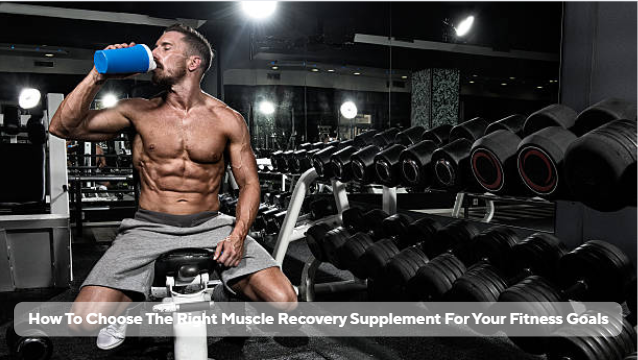You’ve just finished a challenging workout. Your muscles ache, and you hope to recover more quickly for your next session. Your quick fix is muscle recovery supplements. But with so many options, how do you pick the right one?
Whether trying to build muscle, lose fat, or stay active, the right supplement can help your body heal, reduce soreness, and improve your performance. Choosing the wrong one, though, can be a waste of money, or worse, it could mess with your health.
This guide will explore choosing the right muscle recovery supplement based on your fitness goals. Let’s make sure your body gets the support it needs.
1. Know Your Fitness Goals
Before buying a muscle recovery supplement, ask yourself, “What do I want to accomplish?” Your goal determines the kind of recovery your body needs.
Your body requires protein and amino acids to repair and grow muscle fibers. You should take supplements like whey protein or BCAAs (branched-chain amino acids) to build muscle.
If you’re losing weight, you still need to recuperate, but you don’t need to eat more calories. Find protein powders or electrolyte mixes with minimal added sugar and minimal calories.
If you run or cycle, your muscles lose energy and electrolytes. Electrolyte powders and carbohydrate-protein blends can help restore balance and reduce fatigue.
The most important thing is not to copy what your workout mate takes. A bodybuilder’s workout might not work for a cyclist. Take the time to make your goal clear. Then, find a supplement that will help you reach that goal.

2. Understand Common Ingredients
Muscle recovery supplements can have many ingredients. However, a few key ones show up most often, and it helps to know what they do.
Protein: This is the most prevalent type of protein. It helps muscles heal and grow. Whey protein absorbs quickly, making it perfect for after a workout. Casein is slower, so it’s great to take before bed.
BCAAs are three critical amino acids: leucine, isoleucine, and valine. They help muscles heal faster and less painfully.
Creatine: A common supplement for building muscle and strength. It helps your muscles make more energy when you work out hard.
Glutamine: May help the immune system and prevent muscle breakdown, especially after a challenging workout.
Electrolytes help restore minerals like salt, potassium, and magnesium lost through sweat. They are vital for keeping you hydrated and your muscles working.
Anti-inflammatory: Some supplements have turmeric or omega-3s to help with inflammation and speed healing.
Always check the list of ingredients. A decent supplement should explicitly say what it contains. If you notice a “proprietary blend” that doesn’t identify the amounts, that’s a warning sign.

3. Check the Quality and Brand Reputation
Not all supplements are the same. Some are of excellent quality and have been tested well. Some might have fillers, hazardous compounds, or ingredients that have yet to be tested.
So, how can you know what’s safe and trustworthy?
Choose brands that have been tested by a third party first. This shows that a third party has examined the product to ensure it is safe, pure, and of good quality. Look for certifications like NSF Certified for Sport, Informed Choice, or USP Verified.
Next, read the reviews, but don’t look at the five-star ratings alone. Check out what people say about the flavor, side effects, outcomes, and how well it digests. Sometimes, the most popular products don’t work for everyone.
You should also see if the business is open and honest. Do they mention all the ingredients? Do they say what each one is good for and let you see your lab results? There is nothing to hide for honest brands.
Avoid products claiming to “build muscle overnight” or “burn fat instantly.” They are likely too good to be true. Choose products from brands that care about quality, not just profit.

4. Match Timing and Dosage to Your Routine
Even the best supplement won’t help much if you take it at the wrong time or in the wrong amount.
First, let’s talk about timing. The best time to take protein powders and BCAAs is 30 minutes after exercising. This is when your muscles are most ready to absorb nutrients and start to heal. Casein protein works best at night since it slowly digests while you sleep.
You can take creatine before or after a workout, but you must do it the same way every time. And if you’re taking electrolytes, drink them slowly during long workouts or after sweating.
Now let’s talk about how much to take. Always use the portion size that is on the label. More isn’t always better. For example, eating too much protein can cause gastrointestinal problems or put stress on your kidneys. You might get bloated if you take too much creatine.
And don’t forget that supplements are just that: supplements. They help with your diet and training, but don’t replace them. Make sure you consume balanced meals, drink enough water, and get enough sleep.
Taking supplements simultaneously with workouts helps your body recover better, not simply harder.
Conclusion
Picking the proper muscle recovery vitamin is not about following trends. You need to know what you want to achieve and the key ingredients. Trust the brand and use it properly.
The right supplement can make your workouts more effective and your recovery faster. But this is just one aspect of the complete picture. Food, exercise, rest, and staying hydrated are all just as important.
So take your time, read the labels, and remember what your body tells you. You’ll get greater results and feel better when you identify what works for you because growth happens during recovery.


